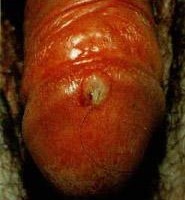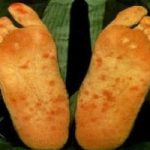Syphilis

Syphilis is caused by a bacterium called Spirochetes. There are three stages of syphilis. During the primary stage, which usually occurs within 10 to 90 days after exposure, a sore (chancre) may appear on the external genitals, anus or in the rectum. They also can appear on the lips and in the mouth. During the second phase, which usually occurs within 17 days to six-and-a-half months after exposure, a rash may appear on various parts of the body. If left untreated, syphilis can proceed to the latent stage during which it may have no visible symptoms but can cause irreversible damage to the brain and other internal organs.
How is it spread?
Syphilis is transmitted through direct contact with sores during sex with an infected person. It’s transmitted by giving or receiving anal, vaginal or oral sex and by anal contact. A person can easily pass the disease to sex partners during stages 1 and 2. Syphilis is not transmitted through such causal contact as hugging, sharing food, using the same eating utensils, drinking from the same glass, sitting on public toilets, or touching door knobs.
What are the symptoms?
1st Stage:
- Painless, reddish brown sore(s) on the mouth, sex organs or fingers (see picture)
- Sores last one to five weeks, then go away, but if untreated, you still have syphilis

2nd Stage:
- A rash anywhere on the body (see picture)
- Flu-like symptoms
- Rash and flu like symptoms go away, but if untreated, you still have syphilis


3rd Stage:
- Uncoordinated muscle movements, paralysis and/or numbness
- Gradual blindness
- Dementia
- At this stage, syphilis is more difficult treat and the damage may be irreversible
How is it treated?
During the primary, secondary, and early latent stages of syphilis, a single injection of penicillin generally cures the disease. People who are allergic to penicillin (and not pregnant) may be given oral antibiotics (such as doxycycline, tetracycline, or erythromycin) for two weeks. Those diagnosed during the latent stage of syphilis will require three injections, each one-week apart. Oral antibiotics (such as doxycycline or tetracycline) are usually given to people in this stage who are allergic to penicillin.
If syphilis has advanced to neurosyphilis (or brain involvement), treatment with IV penicillin every four hours for ten to fourteen days may be required. An alternative is penicillin injections (once per day) with oral probenecid (four times a day) for ten to fourteen days.
How can infection be prevented?
Abstinence is the only 100% effective way of preventing syphilis. However, if you chose to engage in sexual activities and are unsure if you or your partner is possibly infected, consistent and correct use of latex barriers (condoms) can help reduce the risk of transmission. However, only areas covered by condoms, dams or gloves are protected from infection. Avoid contact with any sores or rashes.
If you or someone you know thinks that they may have been exposed to syphilis click on the here for testing. If you’re sexually active, sign-up for free STD testing reminders via email, text or both at WeAllTest.com. If We All Test, we can help eliminate syphilis and other STDs in our community.